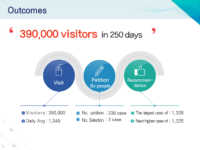The Internet is a great communication tool. People use it all the time both at work and for leisure, but what about interacting with the government? Even though most of the Portuguese public services are digital, its use was below expectations. The answer was the creation of a network of Citizen Spots, which are multiservice physical counters where a “specialized mediator” assists citizens accessing online public services and teaches them how to perform them autonomously thereafter.
Innovation Tag: Citizen Engagement
The Arlington Restaurant Initiative (ARI) is a voluntary accreditation program which aims to increase safety and economic viability for restaurants and special events in Arlington County, VA. The Police Department has partnered with County agencies to establish a holistic approach to nightlife management and raise standards of restaurants that serve alcohol. ARI has been successful in reducing alcohol-related violence and building mutually-beneficial relationships with stakeholders.
The iSPEX is a small attachment that can be fitted to any mobile phone to measure particulate matter in the air. The fact that this piece of technology empowers anyone to monitor air quality (citizen science) creates a raft of new possibilities to collect large volumes of data in a highly efficient and cost-effective manner. Aside from that, it raises awareness of particulate matter among the population.
The municipality of Zeist (approx. 64,000 inhabitants) faced the challenge of having to cut its spending by 6.2 million euros. A decision was made to take the innovative approach of engaging with citizens in a social discussion on possible spending cuts. Through this process of co-creation with its residents, the Zeist local authority not only managed to balance the budget, but it has also helped the local authority forge closer ties with the community and garner broader support for cutbacks.
The former municipality of Molenwaard was the Netherlands’ first local council to operate without a town hall. This innovation came about when three local authorities merged together into one municipality. Despite becoming a much larger municipality they still wanted to stay close to the community. They decided to no longer have a service desk in the traditional sense of the concept. Instead, the local authority goes out into the community and is, therefore, always nearby.
How do we create a safer river delta while at the same time ensuring an attractive living environment? This is the question that the Dutch Directorate-General for Public Works and Water Management (Rijkswaterstaat) sought to answer through its Room for the River program. With this program, the emphasis was shifted from reinforcing dikes to creating more space for the river, with an unprecedented focus on the spatial quality of the whole river delta.
The GovTech Lab is a public sector team focused on encouraging the creation and use of innovative solutions for the government. The GovTech Lab helps the public sector identify challenges that can be solved with emerging technologies, engages startups and SMEs, creating innovative solutions and accelerating startups in #GovTech and #TechForGood space.
Societal challenges such as demographic change affects rural areas in particular. The Social Foresight Lab is an innovative participatory approach towards rural development and technology transfer to address these challenges. It combines foresight, needs assessment and strategy development. Rural areas benefit, as it takes into account regional characteristics, initiates new cooperations among regional stakeholders, and integrates technological and social innovations into regional development.
In most countries residents are entitled to a number of social benefits, but few people ultimately claim these benefits as they may be unaware of them, of who is eligible, how to apply for them etc. Israel was no different, until recently when Kol Zchut developed www.kolzchut.org.il, which holds over 6,000 information pages, serving more than 6 million unique users annually (>50% of Israelis), dramatically increasing public accessibility to information, and boosting claims to benefits.
Previous government-led safety inspection systems were not reflective of social needs and public interest in the foods and drugs that should be on the market.
The new system allows people not only to make policy proposals but to actively participate in food and drug inspections as well.
People are empowered to request inspection or examination of products when there is a growing public concern over the safety of the food or drug in question. The government will respond with an inspection or…




